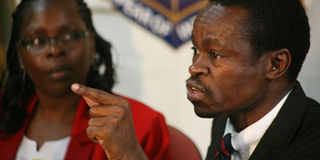Kacc ponders amnesty over graft cases

Kenya Anti Corruption Commission director Patrick Lumumba (right) and the Truth Justice and Reconciliation Commission vice chairperson Tecla Namachanja (left) during a news conference at Integrity Centre, Nairobi February 16, 2011. Kacc is working with the Attorney General’s office to work out ways of granting amnesty to individuals who own up to economic crimes. HEZRON NJOROGE
The Kenya Anti-Corruption Commission is working with the Attorney General’s office to work out ways of granting amnesty to individuals who own up to economic crimes.
The anti-graft agency will also assist the Truth Justice and Reconciliation Commission investigate grand corruption since 1963.
Kacc director PLO Lumumba was speaking at Integrity House in Nairobi when TJRC commissioners led by chairperson Tecla Namachanja paid him a courtesy call Wednesday.
Prof Lumumba and Ms Namachanja announced that a committee comprising of Kacc and TJRC officials has been formed to look into unresolved corruption cases since 1963 and determine if they qualify for amnesty.
“The TJRC mandate gives us a unique opportunity to look into the cases of corruption. Within the law we are allowed to look into specific cases and determine if they could be given amnesty. After receiving an application Kacc is allowed to give amnesty if an individual comes forward,” Prof Lumumba said.
The director said those to benefit from amnesty would be required to make reparation and pay 12 percent interest “and then they would be forgiven their sins".
He said through amnesty, the country would be able to address some of unresolved cases once and for all.
Prof Lumumba disclosed that investigations in high-profile corruption cases had slowed after one of suspects fell ill.
Attorney General Amos Wako who is required to give a nod for prosecution of cases presented to his office has been outside the country, Prof Lumumba said.
“We have forwarded certain files to the AG but I cannot mention the people’s names until the AG gives consideration,” Prof Lumumba said, adding that the “high voltage” cases Kacc was investigating did not only involve ministers but high ranking government personnel.
The director said two to three high profile cases were awaiting the AG’s approval.
“We are going on with the fight against corruption including educating the public to prevent the vice. Investigations are not normally undertaken under the glare of the media. Investigations are going on,” Prof Lumumba said.
The director sent shock-waves in political circles following his announcement last year that Kacc was investigating a number of Cabinet ministers and 45 parastatal chiefs over graft.
Already, a number of ministers have stepped aside over graft- related accusations including Industrialisation minister Henry Kosgey and Foreign Affairs minister Moses Wetang'ula. Eldoret North MP William Ruto was suspended from Cabinet over a case involving the irregular sale of forest land.
TJRC's mandate includes inquiring into human rights violations, including those committed by the State, groups or individuals.
It will also inquire into major economic crimes, in particular grand corruption, historical land injustices and illegal and irregular acquisition of land, especially as they relate to conflict or violence, between December 12, 1963, and February 2008.
Although TJRC mandate ends in November, Prof Lumumba expressed hope that Parliament would extend it for completion of its work.
Ms Namachanja said her organisation is expected to give accurate and historical record of human rights violations and economic crimes and that Kacc’s assistance is crucial.




